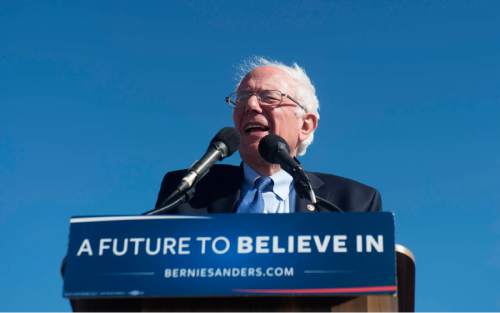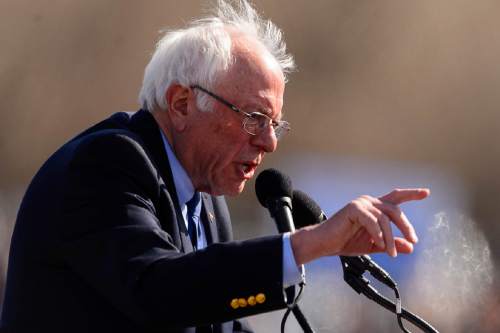This is an archived article that was published on sltrib.com in 2016, and information in the article may be outdated. It is provided only for personal research purposes and may not be reprinted.
Utah's last undecided Democratic superdelegate threw his support behind Bernie Sanders on Wednesday, and the state party finalized its tally from last week's presidential caucuses, in which a high turnout led to a lengthy vote-counting process.
That result remains largely unchanged: a massive victory by Sanders, the Vermont senator, who claimed 77 percent of the vote, over Democratic front-runner Hillary Clinton, who received 20 percent. As early voting predicted, Sanders won 27 delegates while Clinton earned 6.
On top of those pledged delegates tied to the caucus votes of 81,600 Utahns, four party officials hold the special designation of superdelegate, allowing them to support either candidate as they see fit. They split between the candidates.
Wayne Holland, Utah's Democratic committeeman, was the last holdout, and as such received a barrage of calls and emails, some combative — and he engaged. In one such exchange, Holland, a former chairman of the Utah Democratic Party, wrote: "I have known and been an advocate of Bernie for 18 years, which is most likely much longer than many of his current supporters even knew that Bernie even existed."
The party announced his support for Sanders early Wednesday. In an interview, Holland said he's more ideologically in tune with Sanders and he liked that his pick matched the caucus vote. While he says "the odds are long" that Sanders claims the party's nomination, Holland, a union organizer, felt the senator was bringing in new voters with his populist message.
The current party chairman, Peter Corroon, is also backing Sanders, tying his vote to Utah's caucus results. Clinton received the support of Utah Democratic Party Vice Chairwoman Breanne Miller and Democratic Committeewoman Patrice Arent, both saying she is the most qualified candidate, having previously served as secretary of state, a senator from New York and first lady. Miller and Arent have heard from Sanders supporters who want them to switch allegiances, but they are not budging.
Miller said she takes her autonomy seriously and is voting her "conscience." Arent argues that Sanders takes roughly 78 percent of the state's delegates, including superdelegates, so he is being treated fairly.
Utah Democrats will elect the party's slate of national delegates at its state convention April 22 and 23. They will travel to Philadelphia in July for the national convention to officially hand the nomination to the candidate who gets at least 2,383 delegates nationwide.
At this stage, Clinton has the support of 1,243 pledged delegates and 469 superdelegates, according to The Associated Press, while Sanders, who has picked up the support of a series of Western states, now has 980 delegates and 31 superdelegates.





